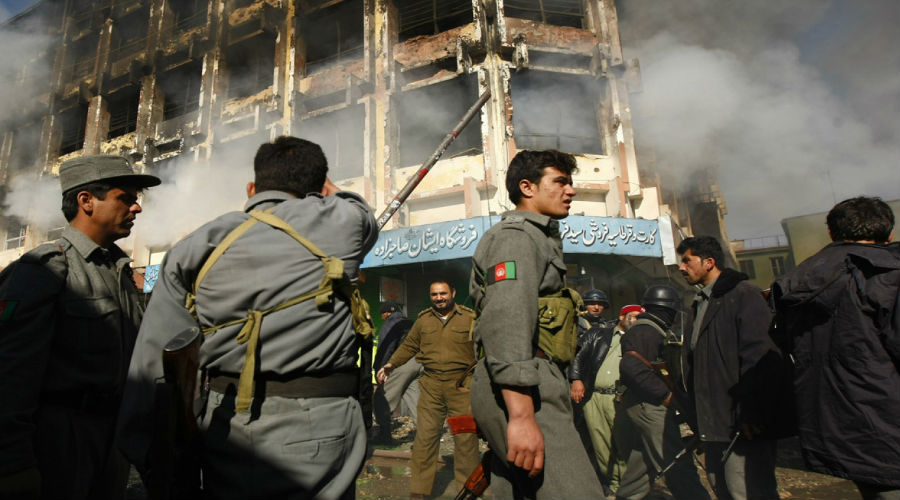Afghan Taliban movement has ramped up its terrorist operations inside Afghanistan. The attacks are no longer confined to targeting police and the military but have gone beyond that to include attacking diplomatic missions and foreign interests. However, it is remarkable that this may not be due to an increase in the capacity of the movement as much as to the erosion of its influence and continuous fragmentation within it.
More precisely, the extreme weakness of the movement in recent period, thanks to the heavy blows it has suffered from more than one side, has pushed it to step up its attacks, without having a major impact on the balance of power within Afghanistan that is facing such chronic security crisis that regional and international forces policies have not succeeded in containing its repercussions.
Multiple attacks
Seemingly, Taliban is escalating in the face of the current numerous challenges, as demonstrated by the recent suicide attack, for which it rushed to claim its responsibility, on January 27, using an ambulance bomb to target a police check-point in the diplomatic district in the capital, Kabul. The district includes numerous security and diplomatic institutions, such as the old building of the Ministry of Interior and Afghanistan High Peace Council (HPC) and some European Union offices, killing 104 people and injuring about 200 others. The recent attack comes a week after a previous attack carried out by six of its cadres on a hotel in the capital, in which 22 people were killed.
Diverse motives
Taliban’s bid to escalate terrorist operations in the current period can be attributed to several factors, most notably the following:
1- Mounting pressures: It was remarkable that Taliban’s high-profile terrorist attacks in the recent period coincided with actions taken by the United States, aimed at undermining and degrading the movement, by cutting off support, especially by parties in Pakistan, according to some reports, as part of the new strategy announced by Washington to address security developments in Afghanistan.
Commenting on the recent terrorist attack, which took place two days ago, the U.S. President Donald Trump, called on all countries to take “decisive action” against Taliban, which reflects the U.S. desire to fight terrorism in Afghanistan. This comes after increasing instability due to the continuous threats posed by the movement and the tendency of some other organizations, such as ISIS, to establish new terrorist hot spots, following a significant decline in its activities in the areas it has controlled in recent years.
According to various U.S. estimates, the number of aerial attacks by the U.S. on terrorist organizations’ sites in Afghanistan during 2017 have increased by three fold, compared to the previous year. The U.S. Special envoy to Afghanistan and Pakistan Alice Wells stressed, on 9 November 2017, that defeating Taliban was the only way to decimate ISIS in Afghanistan, rejecting initiatives put forward by some parties to reach understandings with Taliban to root out ISIS, given the rivalry between them.
It seems that this is inseparable from the flaring tension between the U.S. and Pakistan, after the U.S. accused the latter of “leniency” in dealing with Taliban and its allied militias. This matter was also raised by the President Trump, who asserted that decisive action should be taken against Taliban and its backers.
Therefore, many estimates suggest that Taliban may have deliberately targeted the Intercontinental hotel in Kabul, due to the presence of some foreigners, particularly Americans. The attack killed 22 people, including 14 foreigners, including four Americans, suggesting that Taliban was trying to fire back at the mounting pressures led by Washington.
2- Terrorist race: Taliban’s influence has significantly declined due to ISIS moves to expand its activity within Afghanistan in the last two years. The latter has been able to recruit significant number of Taliban’s leaders and cadres, especially while its influence was growing in key areas in Iraq and Syria.
Hence, the conflict is a hallmark of the relationship between Taliban and ISIS, as reflected in mutual threats to each other. It is remarkable that the actions taken by Washington in the past period have contributed, according to many estimates, to fueling this conflict.
Various U.S. reports indicate that, despite clear American desire to launch strong strikes against Taliban and ISIS in Afghanistan, this did not deter them from attempting to take over more areas which are controlled by the Afghan government. They are racing to be at the forefront of terrorist organizations in Afghanistan, since they consider this is the main mechanism through which they can gain more leverage, have access to multiple sources of finance and recruit new terrorists.
3- Negative repercussions: Increasing instability in some countries is linked to the success of terrorist organizations in enhancing their capabilities. In some cases, however, the erosion of those capabilities could have adverse repercussions, as is evident in the case of Taliban. The latter failed to regain the initiative and reclaim the vast swaths of areas, which it has lost due to the military strikes in recent years, pushing it to attempt to compensate this by carrying out high-profile terrorist operations against government forces, diplomatic missions and foreign interests.
In conclusion, it can be argued that Afghanistan is likely to witness a surge in terrorist operations during the next period, amid constant rivalry among terrorist organizations and their bid to fire back at the actions taken by regional and international forces concerned with Afghan.


